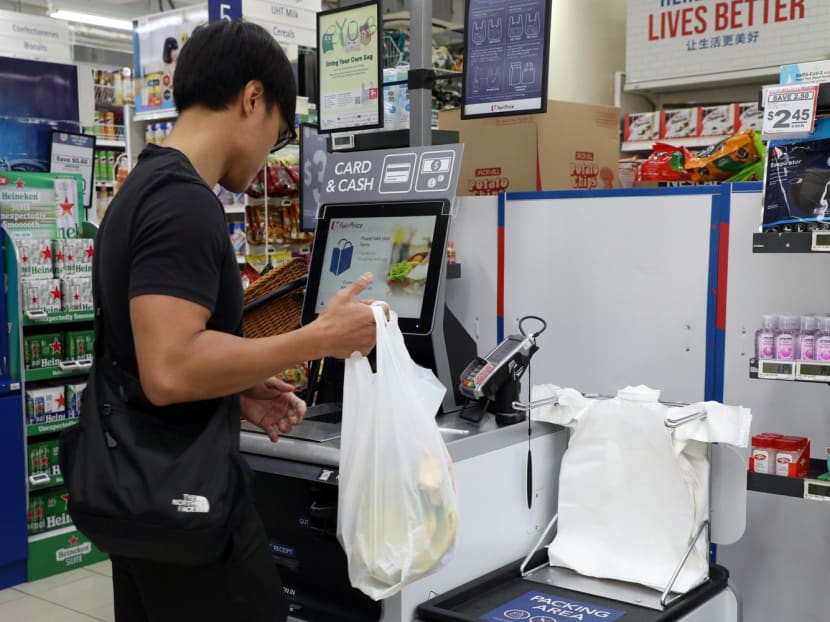Plastic bag charge: Some customers say they will pay or switch to reusables, but scepticism abounds over 'honour system'
SINGAPORE — As Singapore gears up to implement a plastic bag charge at major supermarket chains from July 3, most shoppers say they are sceptical that consumers will abide by the "honour system" that will be rolled out at self-checkout counters.

From July 3, major supermarket chains will start charging at least five cents for each plastic bag.
- Starting July 3, some supermarket chains will use an "honour system" to charge for plastic bags, and some customers expressed scepticism that it will work
- Other customers believe that Singaporeans are generally honest people and will eventually adapt to the new system
- Expert said the honour system must be combined with awareness campaigns and enforcement for best results
- The honour system has been working well for Japanese clothing store Uniqlo
SINGAPORE — As Singapore gears up to implement a plastic bag charge at major supermarket chains from July 3, most shoppers say they are sceptical that consumers will abide by the "honour system" that will be rolled out at self-checkout counters.
Major supermarket chains, including FairPrice, Cold Storage and Giant, have announced that customers will have to self-declare their plastic bag usage at self-checkout counters, which leaves the onus on customers to be honest about their plastic bag usage and pay accordingly.
Asked whether they will embrace the plastic bag charge, some customers said they will pay for the bags while others plan to carry reusable bags.
But when asked whether they think others will comply, some shoppers said that staff should be stationed at self-checkout counters to ensure that people pay for their plastic bags.
Out of nine people whom TODAY spoke to, six doubted that the honour system would work, especially in the early days, saying that Singaporeans are accustomed to free plastic bags and may underdeclare how many they are taking.
Others, however, were more optimistic about the honesty of their fellow Singaporeans, saying that given time to adapt to the new system, most people will comply.
One of the most sceptical people whom TODAY spoke to was also the youngest, 15-year-old student Rei Wong, who believes some shoppers will evade the five-cent charge for each plastic bag.
"There are going to be people pinching their pennies, who will just take without indicating the amount that they want," she said.
Her cynicism was shared by 41-year-old taxi driver Tan Rong Shu, who said that from his observations, Singaporeans tend to behave in selfish ways if there are no penalties.
"It’s just like at McDonald’s. They have ketchup, salt and pepper, and I’ve seen people just take all the pepper and salt. These kinds of small things that nobody will regulate or say anything about, they will just do it,” he said.
Dr Tan Ern Ser, an associate professor of sociology at the National University of Singapore, suggested that supermarkets display a video message to remind people about the harm that plastic can cause to the environment.
"If people strongly believe that single-use plastic could harm the environment and should thereby not be used, or at least only be used sparingly, then they are more likely to comply with the honour system," he said.
Another option, he said, could be for digital screens to prompt customers to indicate the number of plastic bags they have taken, as a self-reminder of the extent of their plastic usage.
SOME OPTIMISTIC THAT PEOPLE WILL ADAPT
There are some, however, who believe that Singaporeans are generally accustomed to following rules and will adapt to the new system, given enough time.
While two of the customers TODAY spoke to said it may take years for local customers to adapt and willingly pay for plastic bags, Mr Lim Seng Kwe thinks that the new system will be effective right away, thanks to widely deployed closed circuit television cameras at supermarkets.
Most people “will not want to make a fool of themselves” for five cents, the 66-year-old retiree said.
Ms Ngo Sok Kheng, a 66-year-old school bus attendant, said that five cents may be trivial to younger shoppers, but older folks may perceive it as a substantial amount, especially if they buy groceries frequently.
Nevertheless, Ms Ngo thinks that while older Singaporeans may initially be unhappy about the plastic bag charge, she doesn't think they will flout the rules because Singaporeans are generally law-abiding people.
NUS' Dr Tan noted that honour systems have had a mixed track record in Singapore, citing for example how it did not quite work in the case of tray returns at hawker centres and food courts.
"In the case of tray return, it was enforcement and the threat of penalty that reduced the rate of non-return," he said.
Ultimately, for the plastic bag charge to be successful, people must be convinced of the environmental causes behind the new regulation.
"(The honour system) is effective to the extent that people are convinced by the 'protect our environment' message. Hence, what is necessary is to convert more people to the message," he said.
But at least one case study offers a ray of hope.
Uniqlo implemented an honour system for its paper shopping bags in October 2020, and according to a spokesperson, the company generally has not faced any issues with it so far.
At self-checkout counters, customers have to add to their bills 10 cents per paper bag, after which they can proceed to take the bags from the shelves.
In response to TODAY’s queries, a Uniqlo spokesperson said that the honour system was first implemented in Japan, and Singapore served as the pilot country for its Southeast Asian stores.
“There are also staff present at the respective counters to help guide and ensure it is a fuss-free process for our customers, so we generally do not experience any issues with regard to (the honour system),” the spokesperson said.









